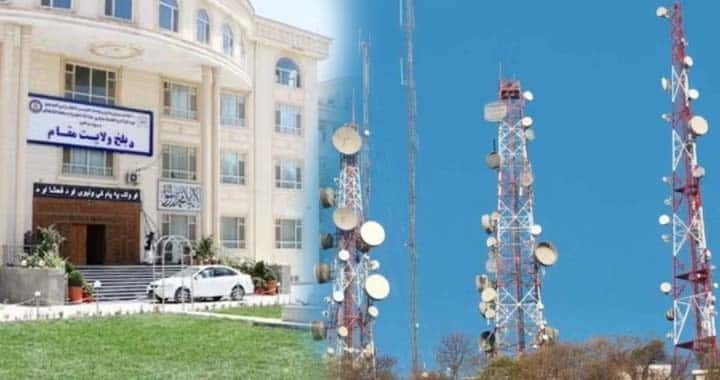The Taliban has cut Wi-Fi services in Mazar-i-Sharif and suspended fibre-optic connections nationwide, in what sources say may be part of a broader effort to restrict high-speed internet access across Afghanistan.
Residents of Mazar-i-Sharif city said the shutdown began on Monday when Taliban authorities ordered service providers to cut Wi-Fi in the city. Local telecommunications companies confirmed the decision, saying it had been issued by Taliban officials. Afghan Telecom and several other providers suspended cable-based internet services, though mobile networks remain operational.
A Kabul-based internet service provider told reporters that the Taliban halted fibre-optic services nationwide about 20 days ago. The company official, who requested anonymity due to security concerns, said providers contacted the Ministry of Communications for clarification but were told the directive had come directly from Kandahar.
According to the source, a Taliban cabinet delegation is expected to travel to Kandahar to brief the group’s supreme leader on the importance of fibre-optic services for major development projects, including the TAPI and TAP regional pipeline initiatives.
A telecom official in Mazar-i-Sharif city also confirmed the shutdown, saying the decision was announced during an emergency meeting between Balkh governor Mohammad Yusuf Wafa and internet providers. He said Wafa told participants that the order had come directly from Taliban leader Hibatullah Akhundzada.
Companies said Taliban leaders have justified the restrictions as a way to curb “immorality.” In previous directives, service providers were instructed to block access to apps such as TikTok and PUBG, as well as pornography websites. Providers said the cost of such filtering was prohibitively high, between $50,000 and $100,000 a month. They managed to block some adult websites but failed to restrict the apps, a shortfall that repeatedly drew Taliban criticism.
Sources said Akhundzada has now opted to suspend high-speed internet altogether in order to control public opinion. The new policy may be implemented gradually, province by province.
Before the fibre-optic shutdown, average internet speeds in Afghanistan reached about 40 megabits per second. Since the suspension, speeds on wireless networks have fallen to between 4 and 6 Mbps.
The Taliban’s move in Mazar-i-Sharif is the latest example of internet restrictions being used as a political tool. According to the global watchdog NetBlocks, there were 296 shutdowns recorded in 54 countries in 2024 alone.
Iran almost entirely cut internet access during protests over rising fuel prices in November 2019 and has since imposed widespread filtering and limits on high-speed services. Russia, since 2021, has throttled internet connections and blocked access to several social media platforms.
In May 2022, the UN Human Rights Office warned that shutdowns severely disrupt daily life, restricting access to information and essential services.
One of The World’s Slowest Networks
Afghanistan already ranks near the bottom of global connectivity. According to data from Ookla’s Speedtest, the country is placed 150th worldwide for internet speeds.
Analysts say the suspension or throttling of high-speed internet will further damage the quality of life in urban areas, where connectivity underpins commerce, education, and entertainment. They warn that the policy could have serious economic, educational, and social consequences, further isolating Afghans from access to information and participation in modern life.
Fibre-Optic Internet Banned in Balkh, Officials Confirm
The Taliban has banned fibre-optic internet in Balkh province on orders from its supreme leader, Hibatullah Akhundzada, a spokesman confirmed Tuesday.
Haji Zaid, spokesman for the Taliban governor in Balkh province, said the decision was made “to prevent immoral activities” and that authorities were now seeking alternatives.
At least three sources confirmed that fibre-optic services have been shut down across Afghanistan for the past three weeks.
Residents in Mazar-i-Sharif city reported Monday that Wi-Fi services in the city had been cut. Telecommunications companies confirmed the shutdown, saying it was carried out under Taliban orders. According to locals, Afghan Telecom and all other cable internet providers have been suspended, leaving only low-speed mobile internet in operation.
The loss of fibre-optic connections has severely restricted access to high-speed internet in Afghanistan. Government offices, private businesses and households can no longer use reliable fast internet, relying instead on slower mobile networks.
The shutdown has disrupted online government services, banking, and remote education, while businesses struggle to operate. Analysts warn the move could further deter foreign investment, restrict Afghanistan’s access to global markets, and deprive students of educational opportunities.
Fibre-optic internet transmits data using light signals through glass cables, offering far greater speed and stability than mobile networks. Afghanistan is connected to international broadband through fibre-optic links with five neighbouring countries.
Figures from the former Ministry of Communications show the previous government invested heavily in fibre-optic projects, including a $150 million initiative funded by $60 million from Afghanistan’s state budget and the remainder by the US Agency for International Development.





